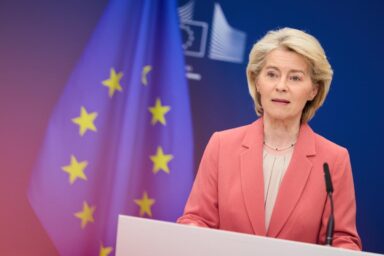Seven years after launching disciplinary proceedings against Hungary, the European Parliament has once again declared that Budapest is trampling on the Union’s values. The effect is overwhelmingly likely to be the same as always: not much to speak of.
The European Union’s values are under direct threat, MEPs say. On November 25th they adopted, by 415 votes to 193, an interim report entitled ‘Existence of a clear risk of a serious breach by Hungary of the values on which the Union is founded’. “It saddens and worries me deeply,” said MEP Tineke Strik (Greens-EFA/NLD), rapporteur for the report. “Hungary has turned into a hybrid regime of electoral autocracy.”
Ms Strik listed the latest outrages: a media landscape “in the hands of pro-government propaganda”, a Sovereignty Protection Office that runs Russian-style probes into civil society, a supreme court that “undermines the primacy of EU law”, and corruption that is “deeply engrained and institutionalised”. Even as she spoke, she noted, police were investigating the organiser of Budapest’s so-called Pride March “simply for peacefully standing up for the rights of LGBTIQ people”.
Parliament’s answer is uncompromising — on paper, anyway. The report urges the Commission to wield infringement lawsuits in a more effective way and to freeze parts or the entirety of EU payments to Hungary. It demands that the Council move from the mild Article 7(1) warning stage (started in 2018) to Article 7(2), which can strip a member state of voting rights. Any further delay, the text says, “would be a breach of the rule-of-law principle by the Council itself”.
You might be interested
The hollow courts
Michał Wawrykiewicz (EPP/POL), fleshed out the legal decay. “Judicial independence has been systematically undermined,” he said. The National Judiciary Council, meant to protect judges, is bypassed; its members resign in protest. A uniformity complaint panel of the supreme court lets the government stall or rewrite European Court of Justice rulings before domestic judges may apply them. “The entire preliminary-ruling procedure is subject to governmental control,” complained Mr Wawrykiewicz.
That legal rot hurts ordinary Hungarians. “Falling real wages, rising poverty, deterioration of public services, squandered EU funds,” the Polish member recited. “Hungarians are living worse while the government consolidates its own power network.”
His fellow countryman Krzysztof Śmiszek (S&D/POL) turned to solidarity, one of the fundamental principles of EU law. Hungary’s conduct over Ukraine showed why values matter, he argued. “While the rest of Europe stands united in support of Ukraine, Hungary has blocked decisions, weakened sanctions and aligned itself with forces seeking to divide us,” Mr Śmiszek said. “Solidarity is not optional.”
Rights chipped away
The Polish Socialist member also chronicled a campaign against minorities. “Discriminatory laws, state-sponsored stigmatisation and silencing of queer voices” have hollowed out freedom of assembly. In schools, Roma children remain segregated and academic freedom is “pushed aside by political control”. The result, he warned, is “an attack on the future of an entire generation”.
MEP Sophie Wilmès (Renew/BEL), tied the deteriorating picture to Brussels’s own failures. “One of the reasons for this situation is not only the action of the government itself; it’s also the non-action of the EU institutions,” she said. She pushed her pet idea of a “rule-of-law semester” that would align all oversight tools in a yearly cycle, making it harder to hide or avoid responsibility. The concept, the Belgian liberal noted with a modicum of satisfaction, has begun to gain momentum.
While the rest of Europe stands united in support of Ukraine, Hungary has blocked decisions, weakened sanctions and aligned itself with forces seeking to divide us. Solidarity is not optional. — MEP Krzysztof Śmiszek (S&D/POL)
Konstantinos Arvanitis (Left/GRE), stressed that the report was “in favour of the people of Hungary” rather than against them. EU membership is voluntary, he said; with membership come rules. “We all see what is happening. We see that the rule of law is being violated,” Mr Arvanitis told reporters.
The Council brick wall
Parliament’s fury is unmistakable. On the one hand, parliamentary approval is a necessary step for any further Article 7 action, should such a situation arise. On the other, its demands matter little, because the next step belongs to the Council, where Hungary holds the strongest card of all—its own veto. Article 7(2) allows the Union to suspend a government’s voting rights only if every other member state, bar the accused, agrees. In practice, this means Budapest needs merely to lift its own little finger to block punishment.
Even the Article 7(1) hearings have stalled. Ministers have not convened one since 2023. Governments prefer back-room bargaining over post-pandemic funds to public show-trials over democracy. Ms Strik accused the Commission of using money transactionally, warning that releasing frozen cash “without real improvements on the ground creates a precedent of political bargaining over fundamental values”.
Hungary has turned into a hybrid regime of electoral autocracy. — MEP Tineke Strik (Greens-EFA/NLD), rapporteur
Hungary’s strongman Prime Minister Viktor Orbán has often shown how he can turn unanimity to his advantage. In recent months he has threatened to veto new EU aid for Ukraine and Sweden’s accession to NATO. On the day of Parliament’s vote rumours swirled that he would soon visit Vladimir Putin again in Moscow. “He is one of the Kremlin’s supporters,” said Mr Wawrykiewicz; “This trip cannot be treated as a peaceful mission.” Ms Strik called it very dangerous, proof that Mr Orbán is “blackmailing the Council” by tying EU security policy to his own agenda.
Watching the ballot box
MEPs hope April’s Hungarian elections might jolt the stalemate. Yet few are optimistic. Ms Wilmès noted that in Budapest she saw a media environment taken hostage by the government and smear campaigns that create “a chill effect”. Free voting demands not only a ballot box but access to information, she said — and that is scarce.
Parliament wants the OSCE to send a full monitoring mission and the Commission to scrutinise gerrymandering or last-minute legal tweaks. “We are not yet there,” Ms Strik warned. With emergency decrees still in force, “Things can happen overnight.” Mr Wawrykiewicz offered a gallows joke: “Stalin once said that it doesn’t matter who votes, it matters who counts the votes.” Civil society, not just Brussels, must guard the count, he argued.
For now the only certainty is more reports. Ms Strik promised to “keep monitoring the developments in Hungary, responding to any further deteriorations”. Parliament has become the Union’s conscience, issuing stern diagnoses while others reach for the chequebook or the calendar. But consciences cannot compel a cure. So long as unanimity reigns in the Council, Mr Orbán can pretty much file each condemnation under foreign meddling and carry on governing in his chosen style.
We all see what is happening. — MEP Konstantinos Arvanitis (Left/GRE)
Another vote, another scolding, another shrug in Brussels—Hungary’s slide and Europe’s paralysis proceed in grim lockstep. Until the treaty changes or Budapest’s voters rebel, the Union’s guardians of virtue can howl, but they cannot bite.











